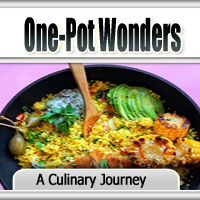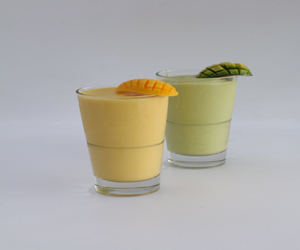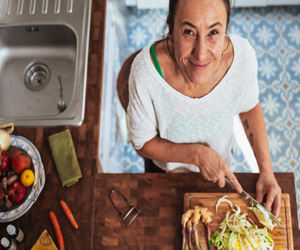


From Uncertainty To Culinary Confidence
The kitchen, with its array of pots, pans, and utensils, can seem like an intimidating place, especially to those who have limited cooking experience. Yet, being a kitchen novice is a point of origin, not a destination. It's the beginning of an exciting journey towards culinary self-discovery, creativity, and nourishment. In this article, we will explore the world of the kitchen novice and how this journey can lead to newfound culinary confidence.
Embracing The Unknown: For the kitchen novice, the realm of cooking is a place where uncertainty often reigns. Simple tasks like chopping vegetables or boiling water can feel like daunting challenges. However, it's essential to understand that every culinary virtuoso was once a novice, navigating through a sea of unfamiliar ingredients and techniques. In embracing the unknown, kitchen novices embark on a journey that holds endless possibilities.
 The Power Of Learning: One of the most remarkable aspects of being a kitchen novice is the learning process. This is where cookbooks, online tutorials, and cooking classes become invaluable tools. Clear and concise instructions empower novices to take their first steps, guiding them through the basics of cooking. This educational phase not only builds essential skills but also instills a sense of accomplishment as novice chefs begin to master fundamental techniques.
The Power Of Learning: One of the most remarkable aspects of being a kitchen novice is the learning process. This is where cookbooks, online tutorials, and cooking classes become invaluable tools. Clear and concise instructions empower novices to take their first steps, guiding them through the basics of cooking. This educational phase not only builds essential skills but also instills a sense of accomplishment as novice chefs begin to master fundamental techniques.
Exploring And Experimenting: As kitchen novices grow in confidence, they naturally gravitate towards exploration and experimentation. Trying out new recipes and different cooking methods becomes an exciting adventure. There's a sense of wonder in discovering how ingredients interact and how flavors meld together. The kitchen evolves from a place of intimidation to one of creative expression.
Building Culinary Confidence: Culinary confidence is a gradual byproduct of this journey. It's the point where kitchen novices realize that they have not only acquired skills but also developed a passion for cooking. The satisfaction of preparing a delicious meal or mastering a challenging dish is immensely rewarding. Kitchen novices begin to relish the act of cooking and take pride in serving their culinary creations.
Culinary Evolution: The beauty of being a kitchen novice is that it's a phase that eventually gives way to culinary expertise. Novices become more skilled, more daring, and more passionate about cooking. The once-daunting kitchen becomes a realm of comfort and creativity.
Being a kitchen novice is not a state of inadequacy; it's the early chapter of a story that can lead to culinary greatness. The journey from uncertainty to confidence in the kitchen is a transformation that takes place one recipe at a time. The kitchen novice evolves into a confident home cook, embracing the joy of cooking and the pleasure of sharing delicious meals with loved ones. So, if you're a kitchen novice, remember that your culinary adventure is just beginning, and the possibilities are endless.
 Hydration And Digestive Health
Hydration And Digestive Health
Staying hydrated is vital for overall well-being, and juices offer a hydrating solution with a nutrient boost. Additionally, many fresh juices contain dietary fiber, which supports healthy digestion and can promote a feeling of fullness.
Convenience And Customization
One of the key advantages of nutrient-rich juices is their convenience. Whether you're in a rush in the morning, need a midday pick-me-up, or want to complement your meals, a fresh juice is a quick and accessible option. Moreover, you can customize your juice to suit your taste and nutritional needs, ensuring that you get the nutrients that matter most to you.
A Multitude Of Varieties
Nutrient-rich juices come in a wide array of flavors and combinations. You can enjoy classic choices like orange, apple, or grape juice, or explore more adventurous blends like a detoxifying green juice with kale, cucumber, and ginger. The choices are almost limitless, and experimenting with different ingredients can be both fun and rewarding.
The Unsung Hero Of Stress-Free Cooking
 2. Stress Reduction: A cluttered, dirty kitchen can contribute to stress and anxiety. Easy cleanup minimizes the chaos and promotes a sense of order and tranquility.
2. Stress Reduction: A cluttered, dirty kitchen can contribute to stress and anxiety. Easy cleanup minimizes the chaos and promotes a sense of order and tranquility.
3. Consistency: When cleanup is straightforward, you're more likely to cook at home more often. This promotes healthier eating habits and reduces reliance on takeout or dining out.
4. Culinary Exploration: The prospect of a time-consuming cleanup can deter people from trying new recipes and techniques. Easy cleanup encourages culinary exploration and experimentation.
5. Enhanced Creativity: A clean and organized kitchen can inspire creativity. You're more likely to try new ingredients and cooking methods when your workspace is free from clutter and mess.
Tips For An Easy Cleanup
Here are some practical tips to make your cleanup after cooking a stress-free experience:
Nourishing Your Body And Mind
 Nutrient Density
Nutrient Density
Whole foods are rich in nutrients, making them an essential part of a healthy diet. They provide an abundance of vitamins, minerals, and antioxidants that nourish the body, strengthen the immune system, and reduce the risk of chronic diseases. Because they are dense in nutrients, they help you meet your daily nutritional requirements with fewer calories, which can support weight management and overall health.
Dietary Fiber
Whole foods, particularly fruits, vegetables, and whole grains, are excellent sources of dietary fiber. Fiber is crucial for digestive health, as it promotes regular bowel movements, prevents constipation, and supports a healthy gut microbiome. Additionally, fiber helps regulate blood sugar levels, reducing the risk of diabetes, and promotes a feeling of fullness, aiding in weight control.
Natural Energy Sources
Whole foods provide a steady source of energy. They release their nutrients more slowly into the bloodstream, preventing the rapid spikes and crashes in blood sugar associated with processed foods. This steadier energy flow helps maintain alertness, focus, and sustained physical and mental endurance throughout the day.
More Than A Caffeine Fix
 In Italy, coffee culture is synonymous with the espresso, a concentrated shot of liquid gold that Italians consume multiple times a day. The espresso bar, or "caffe," is not just a place to get a quick caffeine fix; it's a social hub where people gather to chat, argue, and take a moment to savor life.
In Italy, coffee culture is synonymous with the espresso, a concentrated shot of liquid gold that Italians consume multiple times a day. The espresso bar, or "caffe," is not just a place to get a quick caffeine fix; it's a social hub where people gather to chat, argue, and take a moment to savor life.
In the Middle East, coffee culture revolves around the intricate art of brewing and serving Turkish coffee. This finely ground, strong brew is not merely a pick-me-up; it's a gesture of hospitality and a symbol of cultural identity. The brewing process itself is a mesmerizing dance of tradition and ceremony.
Transforming Your Life For The Better
 Lifestyle change is a concept that holds the potential to redefine our well-being, relationships, and overall quality of life. It involves a deliberate and conscious shift in one's habits, behaviors, and choices, often with the aim of improving health, happiness, and fulfillment. Whether you're seeking to overcome challenges, enhance your personal development, or simply find a better path in life, lifestyle change is a powerful tool to help you accomplish these goals.
Lifestyle change is a concept that holds the potential to redefine our well-being, relationships, and overall quality of life. It involves a deliberate and conscious shift in one's habits, behaviors, and choices, often with the aim of improving health, happiness, and fulfillment. Whether you're seeking to overcome challenges, enhance your personal development, or simply find a better path in life, lifestyle change is a powerful tool to help you accomplish these goals.
The Catalyst For Change
Lifestyle change often begins with a catalyst, a moment of realization that prompts you to reevaluate your current situation. It could be a health scare, a feeling of stagnation, or a desire for greater self-fulfillment. Whatever the trigger, it serves as a powerful motivation to embark on a journey of transformation.
Setting Clear Goals
The first step in making a lifestyle change is setting clear and realistic goals. Whether your focus is on health, career, relationships, or personal growth, defining what you want to achieve is essential.
The Aromatic Soul Of Mediterranean Cuisine
 Basil: Basil is another herb synonymous with Mediterranean cuisine, particularly Italian dishes like pesto. This herb's sweet and slightly peppery notes add freshness to salads and brighten up sauces. Basil is a staple in the Mediterranean diet and is appreciated not only for its taste but also for its potential anti-inflammatory and antibacterial properties.
Basil: Basil is another herb synonymous with Mediterranean cuisine, particularly Italian dishes like pesto. This herb's sweet and slightly peppery notes add freshness to salads and brighten up sauces. Basil is a staple in the Mediterranean diet and is appreciated not only for its taste but also for its potential anti-inflammatory and antibacterial properties.
Rosemary: With its pine-like aroma and robust flavor, rosemary is a quintessential Mediterranean herb. It's often used in roasting meats and vegetables, infusing dishes with a delightful earthiness. Rosemary's association with improved memory and cognitive function makes it a symbol of both taste and health in Mediterranean cuisine.
Thyme: Thyme's aromatic and slightly minty notes make it a versatile herb in Mediterranean cooking. It's used in a wide range of dishes, from soups and stews to grilled seafood. Thyme is also valued for its antimicrobial properties and potential to boost the immune system.
Mint: Mint is another herb with a strong presence in Mediterranean cuisine. Its refreshing flavor complements salads, sauces, and desserts. Mint tea is a common beverage in the region, celebrated for its digestive and soothing qualities.
Parsley: Parsley, with its fresh and slightly peppery taste, is a ubiquitous herb in Mediterranean cooking. It's used to garnish dishes and is an essential ingredient in many Mediterranean sauces and salads. Parsley is known for its high vitamin K content, contributing to bone health and overall well-being.